Biden, Warren Release Similar Climate Investment Plans
Democratic presidential contenders Joe Biden and Elizabeth Warren have released climate plans. Warren’s plan appears somewhat more ambitious, whereas Biden’s plan explicitly endorses carbon-capture technology.
Some specific highlights from Biden:- “100% clean energy economy and net-zero emissions no later than 2050”
- “federal investment of $1.7 trillion over the next ten years”
- “investing $400 billion over ten years” in “clean energy research and innovation”
- including “double down on federal investments and enhance tax incentives for carbon capture, use and storage” and nuclear power research
The Biden plan also notes: “If the global temperature continues to increase at the current rate and surpasses 1.5°C, the existential threat to life will not be limited to just ecological systems, but will extend to human life as well.” However, the goals of the plan do not appear to be in line with the global emissions reductions needed to keep warming below 1.5°C.
In other newsmaking, it appears Joe Biden is accepting the aims of the No Fossil Fuel Money Pledge, if not yet having formally signed on: “Biden for President will not accept contributions from oil, gas and coal corporations or executives.”
Warren released her Green Manufacturing Plan, with highlights including:- ”$400 billion in funding over the next ten years for clean energy research and development”
- ”$1.5 trillion federal procurement commitment over the next ten years”
- ” a new federal office dedicated to selling American-made clean, renewable, and emission-free energy technology abroad and a $100 billion commitment to assisting countries to purchase and deploy this technology”
- “we must cut projected global emissions by more than half by 2030”
The plans are surprisingly similar in terms of scope, especially in terms of the budget expenditures, and in many of the details. Warren’s plan calls for greater expenditure in federal procurement than Biden’s, and appears more ambitious in terms of emissions targets. Notably, Warren frequently refers to the Green New Deal, which she has endorsed, whereas Biden praises the Green New Deal’s “framework” but does not appear to follow its particulars closely.
Update: As first noticed by Credo Action’s Josh Nelson, the Biden plan cribbed some text directly from the labor-environmentalist group Blue Green Alliance and from the fossil-fuel-industry Carbon Capture Coalition. The Biden campaign has since directly credited those organizations, which appear to be advising the campaign.
Former Waxman-Markey Staffers Ana Unruh Cohen and Alison Cassady Hired to Staff Committee on Climate Crisis
Experienced environmental lobbyists and former House colleagues Ana Unruh Cohen and Alison Cassady have been tapped by Rep. Kathy Castor (D-Fla.) to become the chief and deputy chief of staff respectively for the Select Committee on the Climate Crisis. Unruh Cohen had been the deputy director of the committee’s predecessor, the Select Committee on Energy Independence and Global Warming.
They previously worked directly together as staffers helping to craft the American Clean Energy and Security Act (H.R. 2454) for their bosses Rep. Edward Markey (D-Mass.) and Rep. Henry Waxman (D-Calif.) from 2007 until the bill’s demise in 2009.
Dr. Unruh Cohen was a long-time staffer for Markey, moving with him to the U.S. Senate before becoming the top lobbyist for the Natural Resources Defense Council (NRDC); Cassady was a long-time staffer for Rep. Henry Waxman (D-Calif.) before becoming the head of Energy and Environment Policy at the Center for American Progress—a role Unruh Cohen originated in 2004.
Unruh Cohen’s Hill experience also includes working as the deputy staff director of the Natural Resource Committee Democratic staff.
Unruh Cohen holds a bachelor’s in chemistry from Trinity University and received her PhD in earth sciences from Oxford University, where she was a Rhodes Scholar. She is based in NRDC’s Washington, D.C., office.
As the managing director of Energy and Environment Policy at the Center for American Progress, Cassady wrote reports on issues as varied as the social cost of carbon and the power of corporate polluter lobbyists. Cassady joined CAP after working as a senior professional staff member for Rep. Henry Waxman and the U.S. House of Representatives Energy and Commerce Committee, where she focused on unconventional oil and gas development, climate change, air quality, and nuclear issues.
As a House staffer, Cassady led an investigation into hydraulic fracturing, uncovering the continued use of diesel fuel in hydraulic fracturing and writing a first-of-its-kind report on the chemical components of hydraulic fracturing fluids. Cassady developed additional expertise on offshore oil and gas development as a key member of the Energy and Commerce Committee team investigating the BP Deepwater Horizon explosion and oil spill in 2010.
She also served Rep. Waxman during his tenure as chairman of the Committee on Oversight and Government Reform and helped investigate the events leading to the financial crisis in 2008. Before beginning her time in the House, Cassady was research director for Environment America and the U.S. Public Interest Research Group. She is a graduate of the Georgetown University School of Foreign Service.
The Labor Network for Sustainability Outlines How to Make the Green New Deal Work
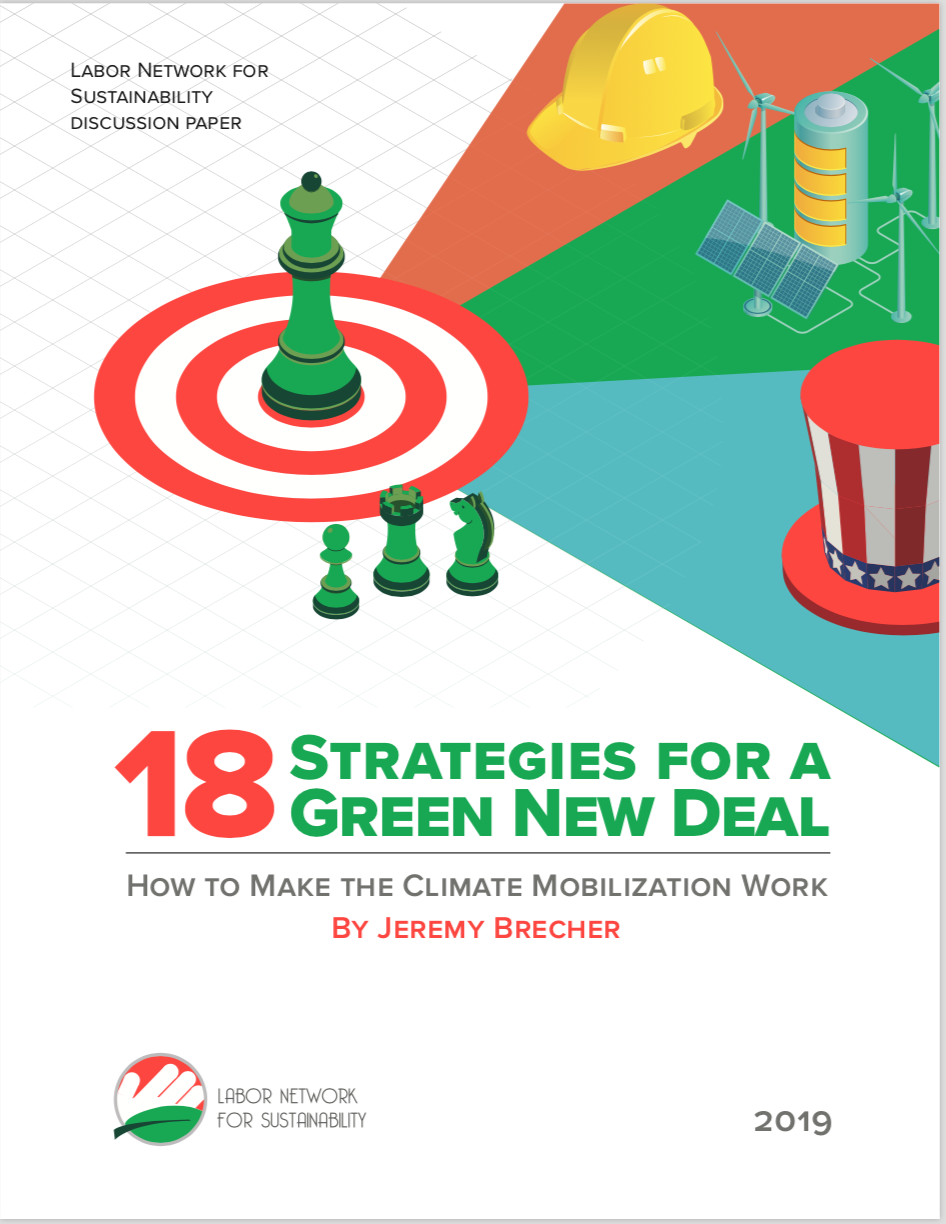 The Labor Network for Sustainability has released “18 Strategies for a Green New Deal: How to Make a Climate Mobilization Work,” a paper intended to “stimulate discussion of the Green New Deal among labor, environmental, progressive, policy, and justice constituencies.” The paper, authored by LNS Research and Policy Director Jeremy Brecher, details 18 strategies for implementing the Green New Deal resolution’s broad goals, organized in three parts:
The Labor Network for Sustainability has released “18 Strategies for a Green New Deal: How to Make a Climate Mobilization Work,” a paper intended to “stimulate discussion of the Green New Deal among labor, environmental, progressive, policy, and justice constituencies.” The paper, authored by LNS Research and Policy Director Jeremy Brecher, details 18 strategies for implementing the Green New Deal resolution’s broad goals, organized in three parts:
- Establish Green New Deal mobilization agencies
- Use regulatory powers to freeze, phase-out, and replace all fossil fuel infrastructure
- Use government to plan the transition
- Establish Green New Deal agencies for reorganizing economic sectors
- Use government to reshape the market
- Use the tools of macroeconomic policy
- Use the powers of government to rectify past and present injustices
- Protect low-income energy consumers
- Empower community-led initiatives
- Democratize democracy
- Leave no worker behind
- Guarantee jobs for all
- Ensure workers rights and good union jobs
- Capture the benefits of the transition to fossil free energy
- Make the polluters pay
- Cut wasteful and unnecessary spending
- Mobilize investment
- Support and fund a Global Green New Deal
The mission of the Labor Network for Sustainability is to engage workers and communities in building a transition to a society that is ecologically sustainable and economically just.
Green New Deal Resolution Now Has 95 Co-Sponsors
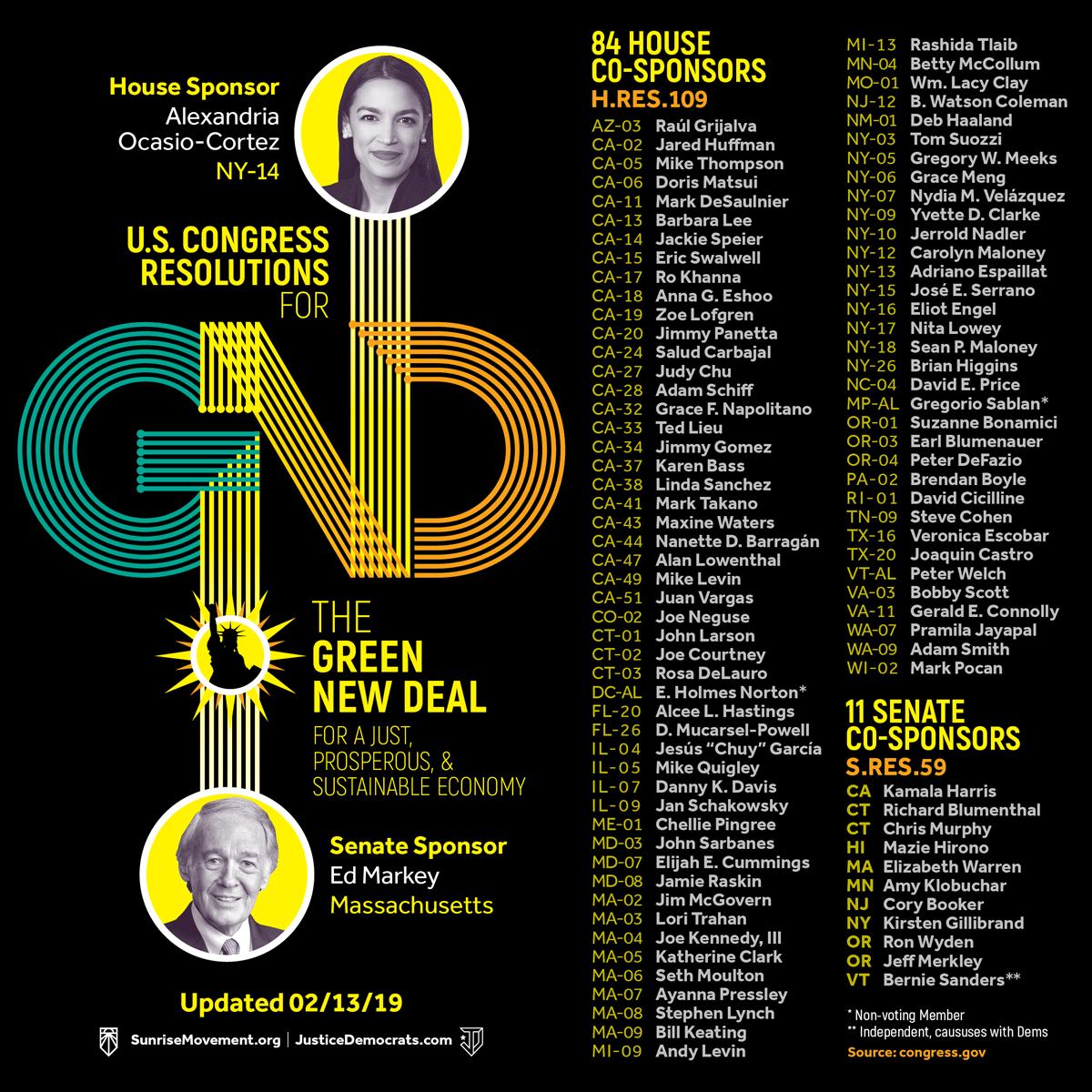 The Green New Deal resolution, H.Res. 109/S.Res. 59, picked up 18 more co-sponsors as of this Wednesday (with committee assignments):
The Green New Deal resolution, H.Res. 109/S.Res. 59, picked up 18 more co-sponsors as of this Wednesday (with committee assignments):
- Rep. Jackie Speier (D-CA-14), Armed Services
- Rep. Eric Swalwell (D-CA-15)
- Rep. Zoe Lofgren (D-CA-19), House Administration Chair
- Rep. Jimmy Panetta (D-CA-20), Agriculture, Ways & Means
- Rep. Grace Napolitano (D-CA-32)
- Rep. Karen Bass (D-CA-37)
- Rep. Linda Sanchez (D-CA-38), Ways & Means
- Rep. Nanette Barragán (D-CA-44), Energy & Commerce
- Rep. Danny Davis (D-IL-07), Ways & Means
- Rep. Katherine Clark (D-MA-05), Appropriations
- Rep. John Sarbanes (D-MD-03), Energy & Commerce
- Rep. Elijah Cummings (D-MD-07), Oversight & Reform Chair
- Rep. William Lacy Clay (D-MO-04)
- Rep. David Price (D-NC-04), Appropriations
- Rep. Tom Suozzi (D-NY-03), Ways & Means
- Rep. Nita Lowey (D-NY-17), Appropriations Chair
- Rep. Bobby Scott (D-VA-03), Education & Labor Chair
- Rep. Adam Smith (D-WA-09), Armed Services Chair
The updated list of co-sponsors is below.
Green New Deal Resolution Picks Up Six More Co-Sponsors
- Rep. Jimmy Gomez (D-CA-34)
- Rep. Joe Neguse (D-CO-02), member of the Select Committee on the Climate Crisis
- Rep. Joe Kennedy III (D-MA-04)
- Rep. Nydia Velazquez (D-NY-07)
- Rep. Yvette Clarke (D-NY-09)
- Rep. David Cicilline (D-RI-01)
The updated list of co-sponsors is below.
Green New Deal Resolution Launches With 61 Representatives, 13 Senators as Co-Sponsors
Following Thursday’s announcement of the Green New Deal Ocasio-Markey resolution, supporters have announced several dozen co-sponsors, including 61 members of the House of Representatives (two non-voting) and 9 U.S. senators.
The list, from Justice Democrats, is below:
FULL TEXT: Rep. Ocasio-Cortez and Sen. Markey Release Green New Deal Resolution
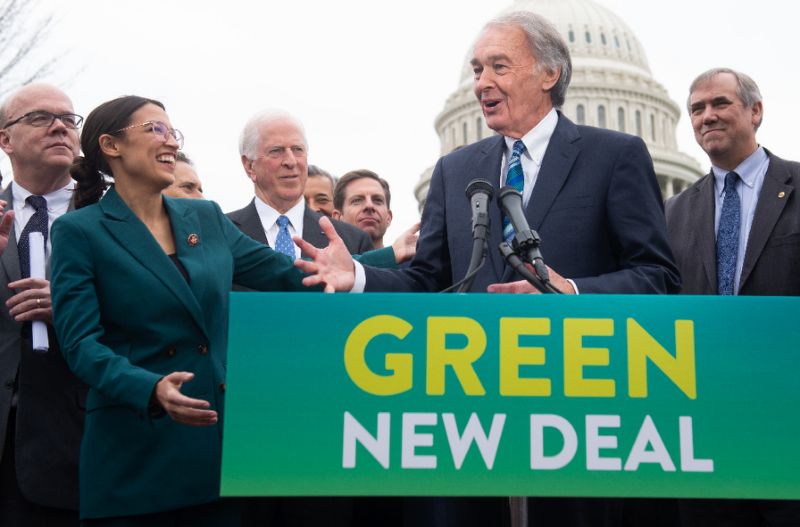 In front of the U.S. Capitol building, Rep. Alexandrio Ocasio-Cortez (D-N.Y.) and Sen. Ed Markey (D-Mass.) today announced the introduction of resolution “recognizing the duty of the Federal Government to create a Green New Deal” that builds a just, full-employment economy to stop global warming.
In front of the U.S. Capitol building, Rep. Alexandrio Ocasio-Cortez (D-N.Y.) and Sen. Ed Markey (D-Mass.) today announced the introduction of resolution “recognizing the duty of the Federal Government to create a Green New Deal” that builds a just, full-employment economy to stop global warming.
The resolution now has 64 original co-sponsors in the House and 9 in the Senate.
The full text of the resolution (PDF) is below:
Democrats Announce Members of Select Committee on the Climate Crisis
Rep. Kathy Castor (Fla.), chair of the House Select Committee on the Climate Crisis, has announced the Democratic members: Reps. Ben Ray Luján (N.M.), Suzanne Bonamici (Ore.), Julia Brownley (Calif.), Sean Casten (Ill.), Jared Huffman (Calif.), Mike Levin (Calif.), Donald McEachin (Va.) and Joe Neguse (Colo.).
Luján is by far the biggest recipient among the committee of fossil-fuel dollars. He received $159,600 in campaign contributions from oil & gas, mining, chemical, electric utilities, and other energy interests in the last election cycle. Over his career, he has received $386,150 from oil & gas and electric utility companies and their employees. As Assistant Democratic Leader, he is now the number four Democrat in the House.
New Climate Committee Chair: Priorities Include Fuel Economy, Flood Insurance
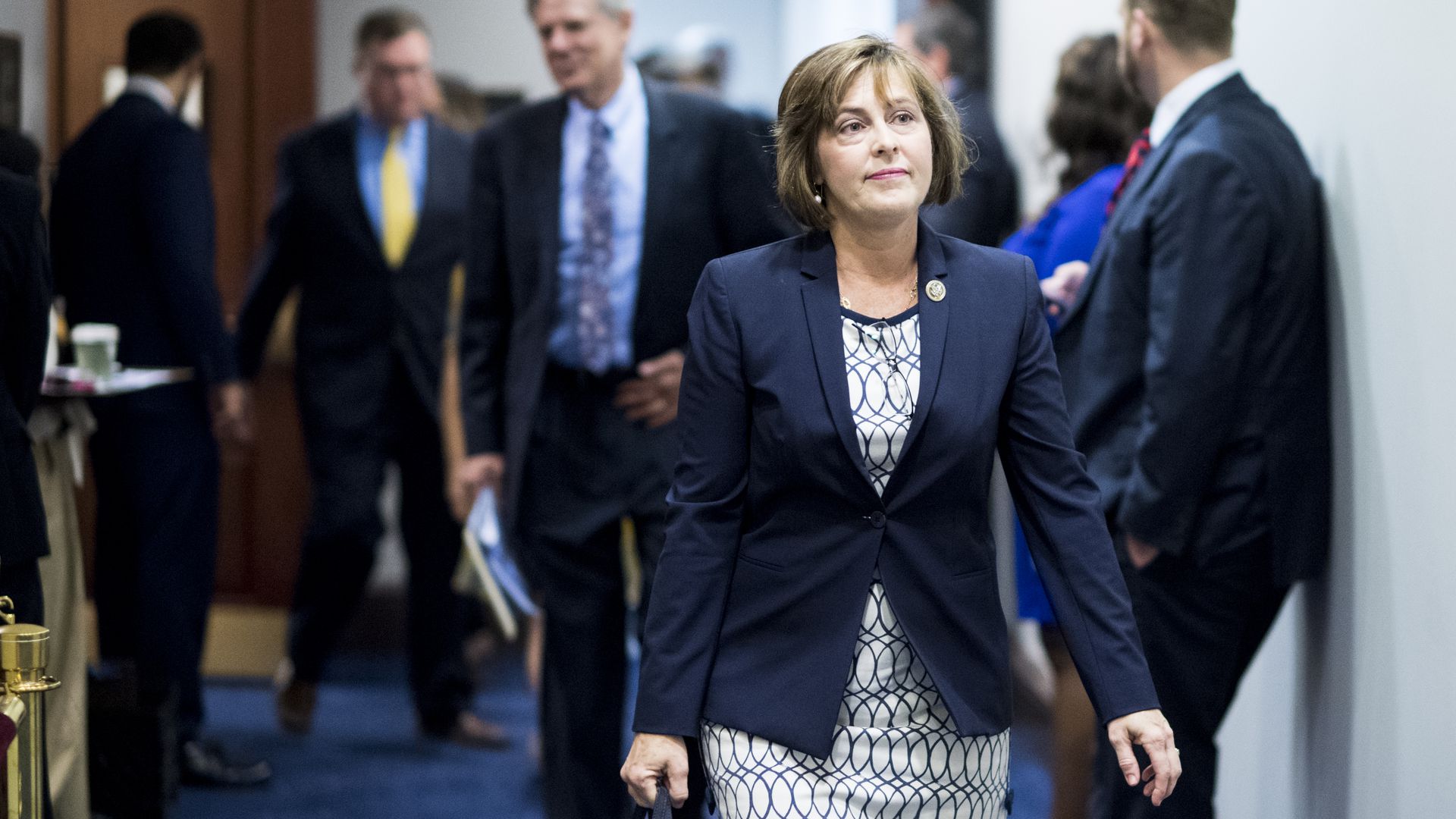 “We are in a race against time,” Rep. Kathy Castor (D-Fla.), the incoming chair of the new Select Committee on the Climate Crisis, told reporters. In an interview with USA Today’s Ledyard King, Castor highlighted not just the urgency of the climate crisis but also her interest in pursuing new fuel economy standards and flood insurance reform, practical policy problems that have remained stalled under the Republican Congress and Trump administration.
“We are in a race against time,” Rep. Kathy Castor (D-Fla.), the incoming chair of the new Select Committee on the Climate Crisis, told reporters. In an interview with USA Today’s Ledyard King, Castor highlighted not just the urgency of the climate crisis but also her interest in pursuing new fuel economy standards and flood insurance reform, practical policy problems that have remained stalled under the Republican Congress and Trump administration.
While not enforcing a band on fossil-fuel contributions for members of the committee, Castor has pledged that she will not accept such donations as chair to “help build confidence in the committee.”
Castor’s plans come in the context of the vigorous push by youth climate activists and new members of Congress for an ambitious Green New Deal, that arguably would build on elements of President Obama’s economic stimulus package of 2009.
“There’s some fabulous proposals in the Green New Deal, and I’m excited about all that. You may see some similar language. Clearly, the focuses are going to be the same,” Castor told The Hill. “This will be a committee clearly in the spirit of the Green New Deal.”
“People don’t understand how forward-leaning the stimulus was on climate issues,” Castor told Michael Grunwald in a Politico interview. “It’s a road map for a Green New Deal.”
More highlights of Rep. Castor’s interview with The Hill’s Timothy Cama:“I’m hoping that folks will come to this committee ready to take on the corporate polluters and special interests. There shouldn’t be a purity test, that if a member of Congress has ever accepted contributions,” she said.Castor said she has decided not to take any donations from fossil fuel companies.
“I think me saying that right now will help build confidence in the committee,” she said, noting that such a pledge won’t be a “huge sacrifice,” since she has received just about $2,000 in campaign donations from the oil and natural gas industries during 12 years in office.
Democratic House Likely To Rekindle ExxonKnew Investigations
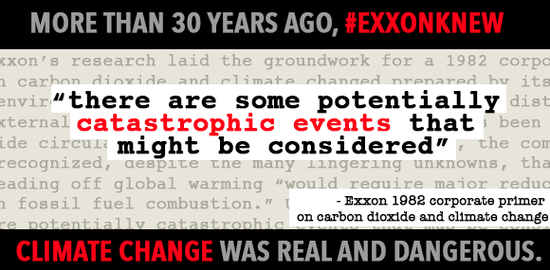 With both houses of Congress under a Republican majority, investigating the malfeasance of the oil industry has not been a priority. Instead, Republicans have held hearings investigating the officials who are investigating the oil industry.
With both houses of Congress under a Republican majority, investigating the malfeasance of the oil industry has not been a priority. Instead, Republicans have held hearings investigating the officials who are investigating the oil industry.
However, with the House moving to Democratic control, Congressional oversight will become a renewed priority. That primarily involves overseeing the work of the Executive Branch, but also includes corporate behavior of national interest.
The “ExxonKnew” controversy is the evidence that Exxon and other oil majors knew for decades that their products cause dangerous global warming but decided to run a disinformation and political interference campaign to avoid regulation of their pollution.
A leading Congressman in calling for investigation is Rep. Ted Lieu (D-Calif.) who repeatedly called for Congressional investigations in 2016. However, he is not currently on the committees with jurisdiction (that could change in the new year).
Another is Rep. Jared Huffman (D-Calif.), a former attorney for NRDC, who sits on the Natural Resources Committee and Committee on Transportation and Infrastructure, both of which potentially have oversight jurisdiction.
Another potential leader on this is Rep. Don Beyer (D-Va.), the incoming chair of the Science Oversight subcommittee, who has spoken out in support of actions by state attorneys general to investigate Exxon.